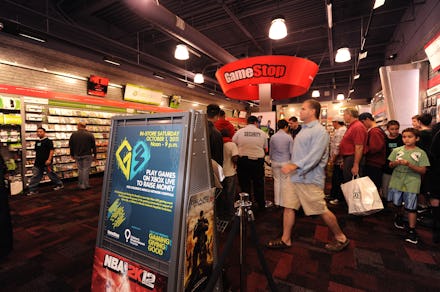GameStop Board Games: Retailer takes a step toward tabletop gaming — and community

Thanks to the rise of online shopping and digital downloads, most gamers have little reason to head to their local video game store. And as the monolithic leader in the shrinking physical retail industry, GameStop need to find ways to diversify if it wants its physical stores to survive. It already started the process with its acquisition of ThinkGeek in June 2015 — now, that diversification continues with baby steps toward niche tabletop gaming, according to a few online listings spotted by iDigitalTimes.
But GameStop has a chance to do more than just improve profits by adding board games to its selection. The retail giant could also bring back a sense of community to its largely abandoned stores.
GameStop has to do more to get consumers in the door.
There was already a slump in media sales when GameStop acquired ThinkGeek. The company needed to start planning for the near future when physical game sales decline to the point where stocking new games costs more money than it's worth.
Walking into a GameStop — or EB Games, if you're Canadian — is a profoundly different experience than it was five years ago. Shelf space that used to house PC games now stocks Funko Pop collectibles in droves. There's a smattering of Pokémon booster packs and the odd gamer-themed mainstream board game littering the shelves.
These days, it's usually a disorganized cacophony of games and game-flavored merchandise. No one really wants to be there anymore — I put out a call on Twitter to confirm it wasn't just me, and the response was pretty unanimous. Clearly, GameStop has to do more than just line its shelves with new products to get people to care about coming in.
It isn't enough to put tabletop games on the shelves.
Games Workshop was a staple of my wargaming tabletop past. I would spend hours with my brother looking at the new minis, enrolling in tournaments and learning new painting techniques. But when Games Workshop hiked its prices and Vancouver became a relentless real estate behemoth GW likely couldn't afford, every single location in the greater Vancouver area was shuttered.
It wasn't enough to put products on shelves. It wasn't enough to have infrequent tournaments or offer painting workshops. People also need convenience and competitive pricing for their hobby, which Games Workshop just wasn't willing to do.
In the same vein, GameStop can't compete on pricing alone. The Amazon Prime discount makes it financially worthwhile to keep one's butt on the couch, even if the tabletop games discount isn't quite as steep as it is for video games.
To succeed, GameStop needs to create a place for consumers to come and learn about tabletop games as well as purchase them — you can bet there are places in the U.S. that have a GameStop and don't have a friendly local game store. That's a huge opportunity of which the retailer is uniquely positioned to take advantage.
Tabletop games at GameStop could get new players to the table.
The rise of tabletop games in the mainstream is undeniable. If Target is getting a slice of the tabletop pie as of 2016, GameStop should've been in this space two years ago when it acquired ThinkGeek. Better late than never, though.
GameStop stocking tabletop games would mean it has better access to an untapped market: consumers who are brand-new to tabletop gaming or unaware of it altogether.
But as with Games Workshop, it isn't enough to have the product on the shelves. Part of the FLGS charm is demo days and special events, like Tabletop Day and D&D afternoons. If GameStop wants to truly tap into the tabletop gaming market, it has to do more. While Target has the luxury of being vastly diverse in its products, GameStop doesn't.
GameStop has an opportunity to bring community to a generation of gamers who may have missed out on the peak of couch co-op gaming and to demonstrate the joys of tabletop gaming. The potential for after-hours events and in-store game demos on weekends would give these new tabletop gamers a place to go enjoy their newfound hobby.
Here's how GameStop could appeal to hardcore tabletop gamers.
Plenty of board gamers already have a store they're committed to, but GameStop could use some of its old tricks to pry away even the most devoted FLGS customers.
If GameStop really wanted to capitalize on the growing board-game market, it should extend its trade-in program to tabletop games, too. No more would we have to wait for community board-game swap meets or for our least-loved board games to gather dust in some forgotten corner of the basement.
We could trade in Arkham Horror and get credit toward Gloomhaven instead. Trade-in credits likely wouldn't be enough to get an old-school tabletop gamer like me to start shopping at GameStop, but it would be an easy and accessible way to ease new gamers into the hobby.
It's an exciting moment for tabletop fans, even if all we have to go on for now is a few board games listed on their website. GameStop has the potential to bring board-game communities to regions that are currently missing out. If it succeeds, it will be reaping more than a profit — it might even find a way back to consumer goodwill.
More gaming news and updates
Check out the latest from Mic, including our list of video games that made fun of their players, a personal essay about dealing with anxiety through Breath of the Wild, a look at the racist and sexist experiences in eSports and a plea for better character customization options for black characters.